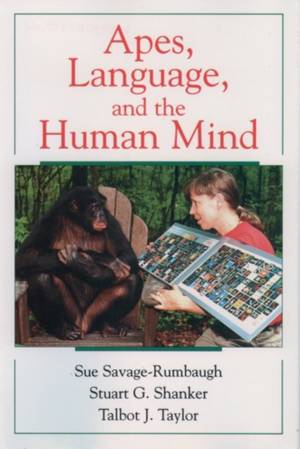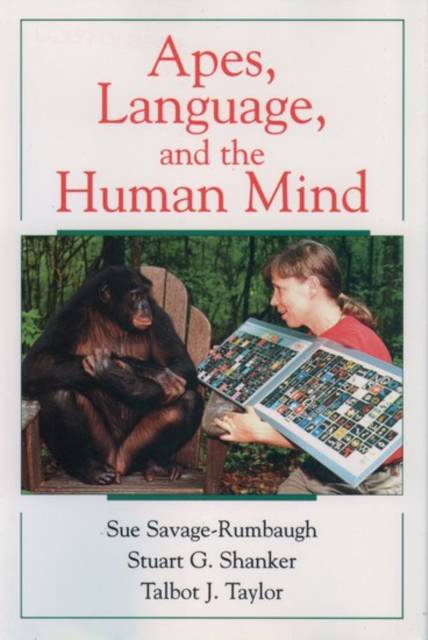
- Afhalen na 1 uur in een winkel met voorraad
- Gratis thuislevering in België vanaf € 30
- Ruim aanbod met 7 miljoen producten
- Afhalen na 1 uur in een winkel met voorraad
- Gratis thuislevering in België vanaf € 30
- Ruim aanbod met 7 miljoen producten
Zoeken
Apes, Language, and the Human Mind
Sue Savage-Rumbaugh, Stuart G Shanker, Talbot J Taylor
Hardcover | Engels
€ 71,95
+ 143 punten
Uitvoering
Omschrijving
Current primate research has yielded stunning results that not only threaten our underlying assumptions about the cognitive and communicative abilities of nonhuman primates, but also bring into question what it means to be human. At the forefront of this research, Sue Savage-Rumbaugh recently has achieved a scientific breakthrough of impressive proportions. Her work with Kanzi, a laboratory-reared bonobo, has led to Kanzi's acquisition of linguistic and cognitive skills similar to those of a two and a half year-old human child.
Apes, Language, and the Human Mind skillfully combines a fascinating narrative of the Kanzi research with incisive critical analysis of the research's broader linguistic, psychological, and anthropological implications. The first part of the book provides a detailed, personal account of Kanzi's infancy, youth, and upbringing, while the second part addresses the theoretical, conceptual, and methodological issues raised by the Kanzi research. The authors discuss the challenge to the foundations of modern cognitive science presented by the Kanzi research; the methods by which we represent and evaluate the abilities of both primates and humans; and the implications which ape language research has for the study of the evolution of human language. Sure to be controversial, this exciting new volume offers a radical revision of the sciences of language and mind, and will be important reading for all those working in the fields of primatology, anthropology, linguistics, philosophy of mind, and
cognitive and developmental psychology.
Apes, Language, and the Human Mind skillfully combines a fascinating narrative of the Kanzi research with incisive critical analysis of the research's broader linguistic, psychological, and anthropological implications. The first part of the book provides a detailed, personal account of Kanzi's infancy, youth, and upbringing, while the second part addresses the theoretical, conceptual, and methodological issues raised by the Kanzi research. The authors discuss the challenge to the foundations of modern cognitive science presented by the Kanzi research; the methods by which we represent and evaluate the abilities of both primates and humans; and the implications which ape language research has for the study of the evolution of human language. Sure to be controversial, this exciting new volume offers a radical revision of the sciences of language and mind, and will be important reading for all those working in the fields of primatology, anthropology, linguistics, philosophy of mind, and
cognitive and developmental psychology.
Specificaties
Betrokkenen
- Auteur(s):
- Uitgeverij:
Inhoud
- Aantal bladzijden:
- 254
- Taal:
- Engels
Eigenschappen
- Productcode (EAN):
- 9780195109863
- Verschijningsdatum:
- 18/06/1998
- Uitvoering:
- Hardcover
- Formaat:
- Genaaid
- Afmetingen:
- 157 mm x 236 mm
- Gewicht:
- 566 g

Alleen bij Standaard Boekhandel
+ 143 punten op je klantenkaart van Standaard Boekhandel
Beoordelingen
We publiceren alleen reviews die voldoen aan de voorwaarden voor reviews. Bekijk onze voorwaarden voor reviews.











